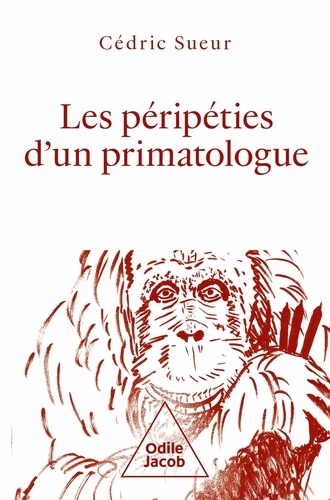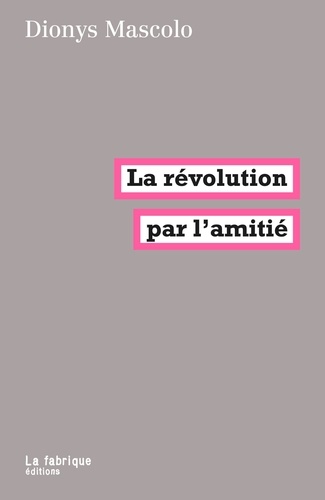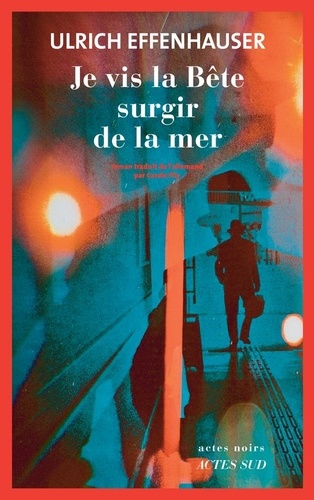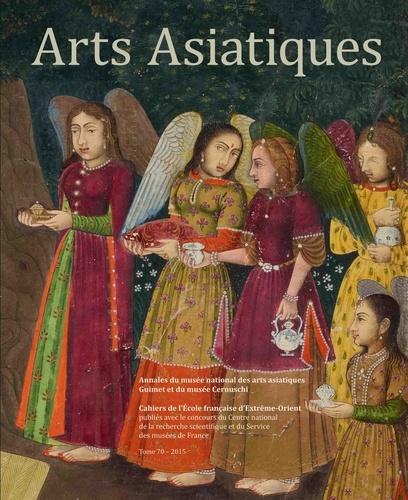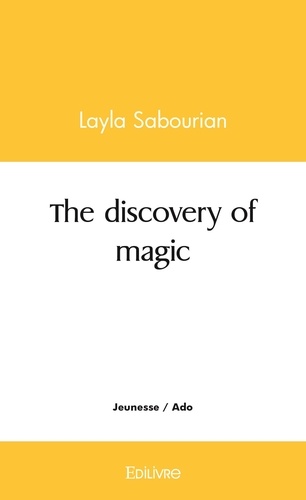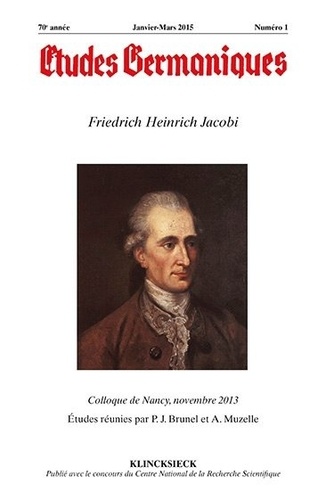Études germaniques - N°1/2015. Friedrich Heinrich Jacobi
Pierre Jean BRUNEL : Oti et dioti. Les enjeux métaphysiques de l'éthique aristotélicienne dans Woldemar de Friedrich Heinrich Jacobi While Aristotle's authority is being challenged by modern philosophy, Jacobi quotes from his Nicomachean Ethics in Woldemar. Daniel Jenisch's edition of the Aristotle Ethics proves to be a major source for the understanding of the novel's "philosophical intent" . What is the significance of such a philosophical revival of Aristotle as the result of the novel ?? To what extent does the variance between the "commercial society" and the ancient doctrine of virtue throw light upon ethical and metaphysical stakes ?? How does the novel handle the philosophical question of immediate knowledge ?? The reading of Nicomachean Ethics does provide us with a model of conversion for the crisis of the modern subject. Während die Autorität des Aristoteles von der modernen Philosophie in Frage gestellt wird, bezieht sich Jacobi in Woldemar auf die Nikomachische Ethik. Daniel Jenischs Übersetzung (1791) stellt eine wichtige Quelle dar, um die "philosophische Absicht" dieses Romanes zu verstehen. Was bedeutet diese Rückkehr des Aristoteles dank des Romans ?? Inwieweit hat der Konflikt zwischen der modernen commercial society und der alten Tugendlehre eine ethische und metaphysische Tragweite ?? Wie wird die philosophische Frage nach der unmittelbaren Erkenntnis im Roman behandelt ?? Bedeutet die Lektüre der Ethik ein Bekehrungsmodell für die Krise des modernen Subjektes ?? Ives Radrizzani : La Destination de l'homme - la réponse de Fichte à la Lettre ouverte de Jacobi ?? The Vocation of Man is Fichte's response to Jacobi. Fichte follows a double strategy : he provides us with his system of defense against the accusations made to the Doctrine of Science in the Letter to Fichte (subjectivism, solipsism, nihilism), on the other part, he tries to build a link to the non-knowledge of Jacobi. With the ternary structure of the work, Fichte shows its commitment to the position that was already his at the time of the Quarrel of pantheism : he still holds necessary a mediation of Knowledge between Doubt and Faith and doesn't agree the Jacobian salto mortale. But the Knowledge and the Faith staged in the last two books of the work are precisely calibrated to demonstrate to Jacobi their agreement in these two areas. The reaction of Jacobi shows the discrepancy between the expectations of Fichte and the result. Die Bestimmung des Menschen bringt Fichtes Antwort auf Jacobi. Fichte verfolgt zwei Ziele : es gilt auf der einen Seite für ihn, sein Verteidigungssystem gegen die im Brief an Fichte entgegen der Wissenschaftslehre geäußerten Anschuldigungen (Subjektivismus, Solipsismus, Nihilismus) darzustellen, auf der anderen Seite einen Übergang zum jacobischen Nichtwissen zu ermitteln. Mit der dreiteiligen Struktur der Schrift zeigt Fichte, daß er der Position, die er schon beim Pantheismusstreit vertrat, treu bleibt : er hält eine Vermittlung durch das Wissen zwischen dem Zweifel und dem Glauben für notwendig und setzt sich dem jacobischen salto mortale entgegen. Aber die in den zwei letzten Büchern der Schrift inszenierten Wissen und Glaube sind genau darauf abgezielt, um Jacobi ihre Übereinstimmung in jenen zwei Bereichen unter Beweis zu stellen. Jacobis Reaktion zeigt die ganze Diskrepanz zwischen Fichtes Erwartungen und dem Ergebnis. Patrick Cerutti : Naître à l'existence "Je me souviens de cet instant plein de joie et de trouble, où je sentis pour la première fois ma singulière existence" . This paper traces the historical evolution of a metaphor, the one of awakening or birth to being, as it appears in Buffon's, then Rousseau's, Jean Paul's and Jacobi's works. Jacobi, after many modifications of meaning, bases his whole conception of a feeling of existence on it, since it depends on the spirit rather than the senses. "Je me souviens de cet instant plein de joie et de trouble, où je sentis pour la première fois ma singulière existence" . Der vorliegende Artikel gibt die Geschichte der Metapher des Erweckens oder der Geburt zur Existenz wieder, wie sie in Werken Buffons, dann Rousseaus, Jean Pauls und Jacobis erscheint. Durch manche Bedeutungsveränderungen baut Jacobi auf diesem Bild seine ganze Konzeption des Gefühls der Existenz auf, insofern als sie eher von einem Gefühl des Geistes als von der Empfindung abhängt. Alain muzelle : Friedrich Schlegel lecteur critique de Jacobi Jacobis Woldemar is a review Friedrich Schlegel wrote in 1796 from the final version of the novel. With this work, the young writer inaugurates the series of his "Charakteristiken" . Under the influence of Fichte's philosophy, he develops a new form of criticism, a genetic method that explains the poetic works from the point of view of their progressive construction, on the basis that "one can understand a book or a mind only through reconstructing its internal dynamics" . After having showed the weakness of the plot and portrayed Woldemar as a vulgar and selfish immoralist, he refuses to acknowledge the work any specifically philosophical value, arguing that he cannot succeed in finding any consistency in the course of the argument. Finally, the profound unity of the book is to be found, for Schlegel, in the individuality of its creator, whom he defines as a "mystical sophist" . Mit Jacobis Woldemar, einer Rezension, die Friedrich Schlegel 1796 über die endgültige Fassung dieses Romans verfasst, entsteht die erste seiner Charakteristiken. Unter dem Einfluß von Fichtes Philosophie entwickelt Schlegel eine neue Art von Kritik, eine genetische Methode, welche die poetischen Werke aus ihrem Werden erklärt, da man erst "ein Werk, einen Geist [versteht], wenn man den Gang und Gliederbau nachkonstruieren kann". Nachdem er auf die innere Brüchigkeit der Romanhandlung hingewiesen und von der Titelgestalt das Porträt eines immoralistischen groben Egoisten entworfen hat, was ihn dazu führt, Jacobis ethische Lehre in Frage zu stellen, spricht er dem Werk jegliche echt philosophische Dimension ab, da es ihm an einer Kontinuität der philosophischen Gedankenführung fehle. Schlegel erkennt schließlich die eigentliche Grundeinheit des Romans in der Persönlichkeit des Schriftstellers selbst, den er als einen mystischen Sophisten definiert. Sylvie LE MOËL : La traduction française de Woldemar, "roman philosophique et sentimental" - une médiation avortée ?? This study proposes to reassess the only translation in French of the novel Woldemar, published soon after it appeared in Germany but which quickly sank into oblivion. As the first attempt of Franco-German mediation by the publicist Charles Vandenbourg, who, at the time, had emigrated to Germany, it represents an enlightening example of the philological and philosophical stakes specific to the Franco-German intellectual transfer around the 1800s. The current article analyses the initial conditions and the publishing modes of the transfer, the translation strategy of Charles Vandenbourg as well as the revealing role played by the text in resetting the intellectual fields under the Directoire. Although it was a failure, this translation lead up to the penetration of Jacobi's philosophy in France, in a context of the philosophical debates opposing the Idealists and the Ideologists, later echoed by Madame de Staël. Vorliegender Beitrag untersucht die einzige französische Übersetzung von Jacobis Roman Woldemar, die zwar kurz nach der deutschen Originalfassung erschien, dafür aber schnell in Vergessenheit geriet. Als erster Versuch deutsch-französischer Vermittlung durch den nach Deutschland emigrierten französischen Publizisten Charles Vanderbourg stellt sie ein einleuchtendes Beispiel für den philologischen und philosophischen deutsch-französischen Transfer um 1800 dar. Die Studie befasst sich mit den Ausgangsbedingungen und den verlegerischen Modi des Transfers sowie mit Vanderbourgs Übersetzungsstrategien, wobei der französische Text die Neugestaltung des französischen intellektuellen Feldes zur Zeit des Direktoriums erkennen lässt. Dieser scheinbar gescheiterte Transfer nimmt also doch die Einführung von Jacobis Philosophie in Frankreich vorweg, und zwar im Kontext von Debatten zwischen Idealisten und Ideologen, an die Madame de Staël kurz darauf anknüpft. Norbert WASZEK : La référence à Adam Ferguson dans Woldemar de Friedrich Heinrich Jacobi At the centre of this article is an analysis of the presence of Adam Ferguson, a leading member of the Scottish Enlightenment, in Jacobi's philosophical "novel" Woldemar. Although often neglected by Jacobi scholarship, Ferguson is mentioned and quoted approvingly on several occasions in Woldemar, and his implicit impact might reach even further. Initially, the ground for such an analysis is prepared by recalling the empirical evidence for Jacobi's reading of Ferguson as is to be found in the catalogue of his personal library and in his voluminous correspondence. Then, standing back from details of the reception, the wider question is opened, whether an appropriate appreciation of Jacobi's indebtedness to Ferguson might contribute to a correction of certain older images and clichés of Jacobi's thought. Der Beitrag geht einem noch zu wenig beachteten Bezugspunkt von Jacobis Woldemar nach, dem schottischen Philosophen Adam Ferguson, welcher in Jacobis Buch mehrfach ausdrücklich und zustimmend erwähnt und zitiert wird und dessen Einfluss implizit vermutlich noch weiter reicht. Vor dieser zentralen Analyse werden einleitend noch weitere Belege für Jacobis Beschäftigung mit Ferguson aus seinem Briefwechsel und seinen Bibliotheksbeständen vorgestellt und eine kurze Charakterisierung von Fergusons Werk geboten. Ein Ausblick nimmt ein wenig Abstand von den Einzelheiten der Rezeption und eröffnet die weiterführende Frage, ob eine angemessene Würdigung seiner Lektüre von Ferguson dazu beitragen kann, noch immer verbreitete Klischees über Jacobis Denken zu korrigieren. Niall Bond : Ferdinand Tönnies und seine Wechselwirkungen mit der französischsprachigen Welt Research on the institutional establishment of sociology in Europe has for the most part ignored exchanges between the earliest leading French and German sociologists. Yet our research in Ferdinand Tönnies' estate in Kiel has shown us that there were fruitful exchanges and mutual effects between Tönnies and Emile Durkheim, René Worms, Gabriel Tarde and other French-speaking sociologists and philosophers. At the same time, constructions and representations of national traits were obstacles to the fluid transfer of scientific interests and knowledge even across the borders of Europe. This becomes particularly clear when we read Tönnies' and Durkheim's writings during the Great War. Nevertheless, the transposing of Tönnies, who had resisted National Socialism, to other cultural contexts such as the French-speaking world made it possible to deal with his thought in a more neutral and objective fashion than was possible in post-war Germany, which had been traumatised by the recuperation of the term "Volksgemeinschaft" by the Nazis. Dans une grande mesure, la recherche sur la mise en place institutionnelle de la sociologie en Europe a fait jusqu'alors abstraction des échanges entre les premiers sociologues français et allemands. En puisant dans les archives de Ferdinand Tönnies à Kiel, nous constatons toutefois des échanges fructueux et des actions réciproques entre Tönnies et Emile Durkheim, René Worms, Gabriel Tarde et d'autres sociologues et philosophes de langue française. En même temps, les constructions et les représentations de traits nationaux représentaient autant d'obstacles à un passage fluide d'interrogations scientifiques et de savoirs même à travers les frontières de l'Europe. Cela devient surtout clair à la lumière des écrits de Tönnies et de Durkheim sous l'influence de la Grande Guerre. Cependant la transposition de Tönnies, résistant au nazisme, à d'autres aires culturelles comme l'aire francophone a permis un traitement davantage neutre et objectif que celui qui a été possible dans une culture allemande de l'après-guerre traumatisée par l'exploitation du terme de "Volksgemeinschaft" par les nazis. Sonja VANDERLINDEN : Journal fictif, vie romancée, roman, mémoires, confession. Le cas de Tine of de dalen waar het leven woont (1987) de Nelleke Noordervliet The central theme of this contribution is the interaction between fiction and reality in Noordervliet's novel about Multatuli's wife. Speaking is Everdine van Wijnbergen during the last months of her life ?; in a fictional diary she looks back on episodes out of her whole life, with or without Douwes Dekker at her side. This fictional (auto)biography of a historical person is also a confession, an introspection, a self-examination. In this novel three "Tines" appear side by side : the real Everdine, Multatuli's and Max Havelaar's idealized Tine, and Noordervliet's Tine. Nelleke Noordervliet gives a voice to this writer's wife ?; she brings her out of the shadows and offers a nuanced and complex image of her personality. De rode draad in deze bijdrage is het spel met fictie en realiteit in Noordervliets roman over de vrouw van Multatuli. De auteur laat Everdine van Wijnbergen aan het woord tijdens haar laatste levensmaanden ?; in een fictief dagboek kijkt zij terug op episodes uit haar gehele leven, met of zonder Douwes Dekker aan haar zij. Deze fictieve (auto)biografie van een historisch personage is tegelijkertijd ook een biecht, een introspectie, een gewetensonderzoek. In deze roman komen drie "Tines" naast elkaar te staan : de werkelijke Everdine, de geïdealiseerde Tine van Multatuli en van Max Havelaar, en de Tine van Noordervliet. Nelleke Noordervliet geeft een stem aan deze schrijversvrouw, haalt haar uit de schaduw en biedt een genuanceerd en complex beeld van haar persoonlijkheid.
09/2015
